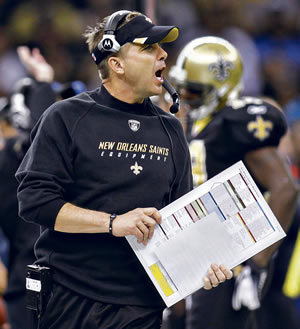Payton: The Scapegoat For The NFL

Saints coach Sean Payton will miss the entire 2013 season because of the bounty system employed by the team. AP photo
Sean Payton, meet Bill Clinton. Mr. President, you may remember coach Payton from the Super Bowl. You two have a lot to talk about.
For some reason, we are supposed to act surprised when a politician is caught diddling the maid or an NFL coach turns a not-so-blind-eye to supposed inappropriate contact on the football field. Just about everyone able to feign indignation, including Sen. Dick Durbin – who has weighed in to gather publicity for the 10 presenters, that is, those few coworkers voters think are actually, surprisingly, doing an adequate job – wants us to know the center of evil in the NFL has shifted southeast. If we are to believe the hype, the New Orleans Saints’ pay-for-pain incentive plan was an affront to honest
competition, and that such actions are not just against the rules, but that they violate the honor code that is at the heart of every NFL player. It seems we’ve entered a time warp back to 1950s fictional baseball where every man is a devoted spouse and every glass is filled with milk.
To quote far too many, we may be dumb but we ain’t stupid.
Of the story to end all stories, Bills linebacker Shawne Marriman tweeted, “Why is this a big deal now? Bounties been going on forever. A “Bounty” left me with a torn PCL and LCL in my knee …” Yet, even with such open commentary, Roger Goodell has gone Area 51 on us trying to convince the public the downed alien craft is just a weather balloon. But no matter the statements or fines designed to carefully control the message, knocking a player out of the game is an accepted approach to victory. No one wants to end a career, but every minute of action missed means a greater chance of success, and with 16 game seasons and average career lengths of 3.5 years, you’ve gotta get yours while you can.
Mike Singletary, one of the more cerebral players in NFL history, said more than once he looked to hit opponents so hard that snot came out of their nose. Ted Hendricks didn’t have to clothesline ball carriers, but it sure was an effective form of tackling, and if it made the opposition weary of running in his direction or someone had to be carted off after the play, then he did his job.
NFL commissioner Roger Goodell made Payton the scapegoat, hitting the coach with a one-year suspension and nearly $6 million in lost income, and just like a young Henry Hill in Goodfellas, he took his pinch like a man and learned two greatest things in life: He didn’t rat out his friends and he kept his mouth shut. But had the crime been so heinous, would Payton’s employers have gotten off so easy?
The Saints got a $500,000 fine and lost two second-round draft picks. In other words, the appropriate punishment for great crime spree of 2012 was equal to the loss of a rookie kicker or two middling lineman.
Big hits aren’t just celebrated, they are a necessary part of the game plan. Plus, the game tends to be self-policing. An egregious hit is met with equal retribution.
Major League Baseball Hall of Fame manager Sparky Anderson was once asked if he ever told a player to hit a batter. He said no, that it was a pitcher’s duty to protect his teammates and mete out punishment as appropriate.
The NFL is no different. To pretend otherwise is just folly.





